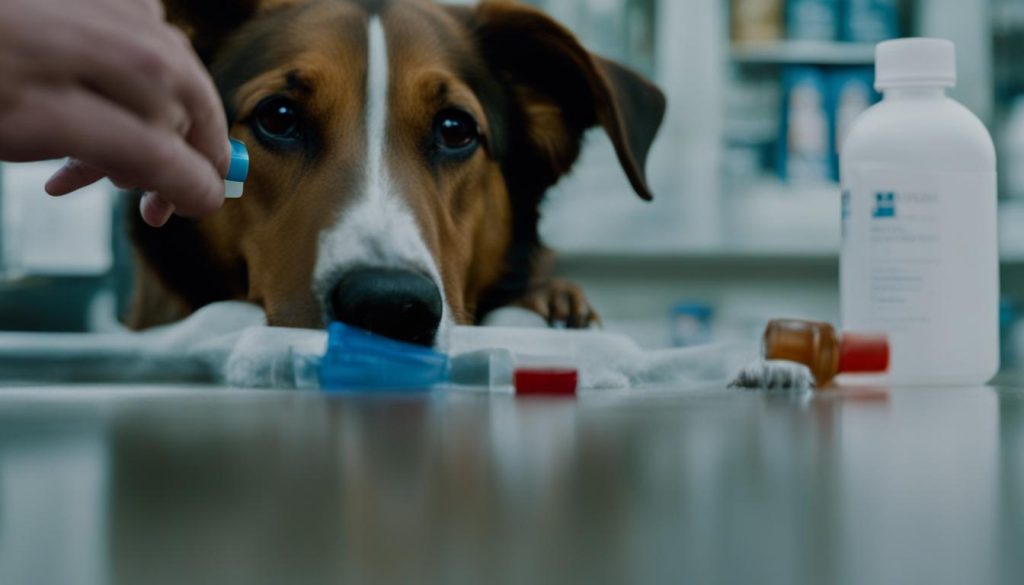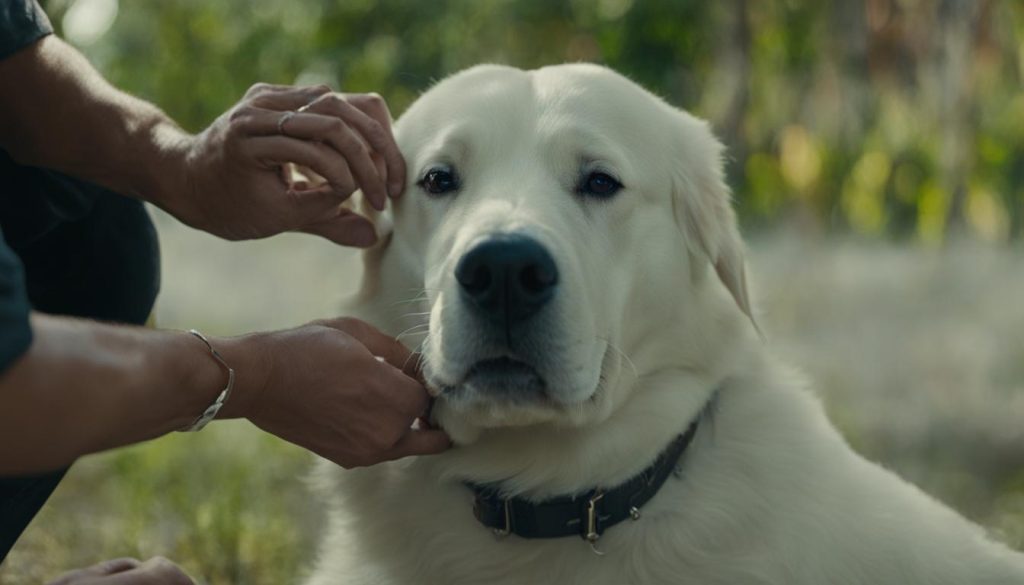If your dog has been making an unusual sound recently, it might be time to take him to the vet. A hoarse bark in dogs could be a sign of something serious, like laryngeal paralysis or a tumor on the voice box. Early diagnosis and treatment are key for preventing long-term damage to your dog’s voice.
The sound of your dog’s bark is produced by the larynx, which contains the vocal cords. If these muscles are damaged or weakened, they will not be able to vibrate properly and your dog’s bark will sound hoarse. Common causes of hoarse bark in dogs include inflammatory laryngitis, gastroesophageal reflux, laryngeal paralysis, masses or tumors, and everted laryngeal saccules.
Key Takeaways:
- Hoarse bark in dogs can indicate an underlying health issue.
- Early diagnosis and treatment are important to prevent long-term damage.
- Common causes of hoarse bark include inflammatory laryngitis, gastroesophageal reflux, laryngeal paralysis, masses or tumors, and everted laryngeal saccules.
- Veterinary care is necessary to determine the underlying cause and develop a suitable treatment plan.
- In addition to medical treatments, there are natural remedies that can help alleviate hoarse bark.
Causes of Hoarse Bark in Dogs

Dogs can develop a hoarse bark due to various factors. Understanding the potential causes can help you identify the underlying issue and seek appropriate treatment. Some common causes of hoarseness in dogs include:
- Inflammatory Laryngitis: This condition can be caused by viral or bacterial infections, allergies, or excessive barking. It results in inflammation of the larynx, leading to a hoarse bark.
- Gastroesophageal Reflux: When stomach acid flows back up into the esophagus and irritates the larynx, it can cause a hoarse bark in dogs. This condition is more common in breeds with short noses.
- Laryngeal Paralysis: Dogs with laryngeal paralysis experience a failure of the muscles in the larynx to properly move the vocal cords. This can result in upper airway obstruction and a hoarse bark.
- Masses or Tumors: Growths on the larynx can interfere with the proper functioning of the vocal cords, leading to hoarseness in a dog’s bark.
- Everted Laryngeal Saccules: Brachycephalic breeds, such as Bulldogs and Pugs, are particularly prone to this condition. It occurs when small sacs in the larynx become turned inside out, causing hoarseness.
Identifying the specific cause of a hoarse bark in your dog is crucial for determining the appropriate treatment plan. Consult with a veterinarian who can conduct a thorough examination and recommend the necessary diagnostic tests to pinpoint the underlying issue.
Inflammatory laryngitis, gastroesophageal reflux, laryngeal paralysis, masses or tumors, and everted laryngeal saccules are common causes of hoarse bark in dogs.
Please be aware that hoarse bark in dogs should not be ignored, as it can be a symptom of a more serious condition. Seeking timely veterinary care is essential to prevent further complications and ensure your dog’s vocal health.
Treatment options for hoarse bark in dogs
The treatment for a hoarse bark depends on the underlying cause. In cases of inflammatory laryngitis, medications such as antibiotics or anti-inflammatories may be prescribed. Gastroesophageal reflux can often be managed with changes in diet and medication to reduce acid production. Laryngeal paralysis and masses or tumors may require surgical intervention. Everted laryngeal saccules can be treated with either steroids or surgical removal.
It’s important to follow the veterinarian’s recommendations and complete the full course of treatment to optimize your dog’s chances of recovering full vocal function. In addition to medical interventions, natural remedies may also be beneficial in supporting the healing process. However, always consult with your veterinarian before trying any natural remedies to ensure they are safe and appropriate for your dog.
| Common Causes of Hoarse Bark in Dogs | Treatment Options |
|---|---|
| Inflammatory Laryngitis | Antibiotics, anti-inflammatories |
| Gastroesophageal Reflux | Dietary changes, medication |
| Laryngeal Paralysis | Surgical intervention |
| Masses or Tumors | Surgical removal |
| Everted Laryngeal Saccules | Steroids, surgical removal |
Diagnosing the Underlying Cause
To determine the underlying cause of a hoarse bark in dogs, a veterinarian will conduct a thorough examination. They may check for signs of infection, perform imaging tests to look for masses or tumors, or conduct a laryngoscopy to assess the condition of the vocal cords.
During the examination, the veterinarian will carefully observe the dog’s behavior and listen to its bark. They will look for any signs of inflammation or swelling in the throat and assess the overall health of the larynx. If there are concerns about masses or tumors, the vet may recommend X-rays, ultrasounds, or even a biopsy to get a definitive diagnosis.
Based on the findings, the veterinarian will be able to identify the specific cause of the hoarse bark. This could range from a simple case of laryngitis to a more serious condition like laryngeal paralysis or the presence of a tumor. Once the underlying cause is determined, appropriate treatment options can be discussed.
Treatment options for hoarse bark in dogs can vary depending on the specific cause. In cases of infection, antibiotics may be prescribed to clear up any bacterial or viral invaders. Anti-inflammatories may be used to reduce swelling and inflammation in the larynx. In more severe cases, such as laryngeal paralysis or the presence of a tumor, surgical intervention may be necessary to restore normal vocal cord function.
Treatment Options for Hoarse Bark in Dogs
| Cause | Treatment |
|---|---|
| Inflammatory laryngitis | Antibiotics, resting the voice, avoiding irritants |
| Gastroesophageal reflux | Antacids, modifying diet and feeding habits |
| Laryngeal paralysis | Surgical intervention |
| Masses or tumors | Surgical removal |
| Everted laryngeal saccules | Steroids, surgical removal |
Please be aware that the specific treatment plan will be determined by the veterinarian based on the individual dog’s condition and needs. Hoarse bark in dogs should never be ignored or left untreated, as it can indicate an underlying health issue that requires attention and care.
Natural Remedies for Hoarse Bark

If your dog has a hoarse bark, there are some natural remedies that can help alleviate the condition. Along with medical treatments prescribed by a veterinarian, these remedies can provide relief and support your dog’s vocal health.
Maintain Vocal Rest
One of the simplest and most effective natural remedies for hoarse bark is to give your dog vocal rest. Just like humans, dogs’ vocal cords need time to heal and recover. Limit your dog’s barking and encourage quiet activities during this time. This can help reduce strain on the vocal cords and promote healing.
Moisturize the Air
Dry air can contribute to hoarseness in dogs. Adding moisture to the air with a humidifier can help alleviate dryness and soothe your dog’s throat. Additionally, keeping your dog hydrated by providing plenty of fresh water can also help prevent dryness and promote vocal health.
Consult with Your Veterinarian
It’s important to consult with a veterinarian before trying any natural remedies for hoarse bark. They can provide guidance and ensure that the remedies are safe and appropriate for your dog’s specific condition. A veterinarian will be able to recommend the best course of action based on the underlying cause of your dog’s hoarse bark.
| Natural Remedies for Hoarse Bark | Description |
|---|---|
| Maintain Vocal Rest | Limit your dog’s barking and encourage quiet activities to reduce strain on the vocal cords. |
| Moisturize the Air | Use a humidifier to add moisture to the air and keep your dog’s throat hydrated. |
| Consult with Your Veterinarian | Always consult with a veterinarian before trying any natural remedies to ensure they are safe and appropriate for your dog’s condition. |
“Natural remedies like vocal rest and air moisturization can help soothe your dog’s hoarse bark and support their vocal health.”
Dog Laryngitis Treatment: Seeking Veterinary Care for Hoarse Bark

If your dog’s bark has been sounding hoarse for more than a week or two, it’s important to seek veterinary care for a proper diagnosis and treatment. Chronic or recurrent hoarseness can be a sign of underlying health issues that require medical attention. By consulting a veterinarian, you can ensure your dog receives the appropriate care and minimize the risk of long-term complications.
“If your dog’s bark has been sounding hoarse for more than a week or two, it’s important to seek veterinary care for a proper diagnosis and treatment.”
During the veterinary examination, the veterinarian will conduct a thorough evaluation to determine the underlying cause of your dog’s hoarse bark. This may involve checking for signs of infection, performing imaging tests to identify masses or tumors, or conducting a laryngoscopy to assess the condition of the vocal cords. Treatment options will depend on the specific cause and may include antibiotics for infections, anti-inflammatories for inflammation, or surgical intervention for conditions like laryngeal paralysis or masses.
When to Seek Veterinary Care for Hoarse Bark:
- If hoarseness persists for more than a week or two
- If hoarseness is recurrent or chronic
Early detection and appropriate treatment can help prevent long-term damage to your dog’s voice and ensure a better prognosis. It’s always better to err on the side of caution and have your dog evaluated by a professional veterinarian to rule out any serious conditions.
| Cause | Treatment |
|---|---|
| Inflammatory Laryngitis | Antibiotics, anti-inflammatories |
| Gastroesophageal Reflux | Antacids, dietary changes |
| Laryngeal Paralysis | Surgical intervention |
| Masses or Tumors | Surgery |
| Everted Laryngeal Saccules | Steroids, surgical removal |
Prevention and Mitigation Strategies

Preventing hoarse bark in dogs is possible by implementing a few key strategies. By taking proactive measures, you can reduce the risk of your dog developing a hoarse bark and maintain their vocal health. Here are some preventative steps you can take:
- Limit excessive barking: Excessive barking can strain the vocal cords and lead to a hoarse bark. Train your dog to bark only when necessary and discourage excessive vocalization.
- Avoid irritants and allergens: Exposure to irritants and allergens can contribute to inflammation in the larynx. Keep your dog away from smoke, chemical fumes, and other potential triggers.
- Manage gastroesophageal reflux: If your dog is prone to gastroesophageal reflux, feed smaller, more frequent meals and ensure they eat slowly and chew properly. This can help prevent the acid from irritating the larynx.
- Regular veterinary check-ups: Schedule regular check-ups with your veterinarian to monitor your dog’s overall health, including their vocal health. This can help identify any underlying issues early on.
In addition to these strategies, providing your dog with a balanced diet, regular exercise, and maintaining a healthy weight can also contribute to their overall vocal health. By following these preventative measures, you can help reduce the risk of your dog developing a hoarse bark and promote their vocal well-being.
Table: Tips for Preventing Hoarse Bark in Dogs
| Prevention Strategies | Description |
|---|---|
| Limit excessive barking | Train your dog to bark only when necessary and discourage excessive vocalization. |
| Avoid irritants and allergens | Keep your dog away from smoke, chemical fumes, and other potential triggers. |
| Manage gastroesophageal reflux | Feed smaller, more frequent meals and ensure your dog eats slowly and chews properly. |
| Regular veterinary check-ups | Schedule regular check-ups to monitor your dog’s overall health, including their vocal health. |
Implementing these prevention and mitigation strategies can help minimize the risk of your dog developing a hoarse bark. By being proactive and prioritizing your dog’s vocal health, you can ensure they maintain a healthy and clear voice.
Potential Complications and Long-Term Outlook
When a dog has a hoarse bark, it is important to understand the potential complications and long-term effects that may arise. The outlook for a hoarse bark in dogs depends on the underlying cause and the effectiveness of treatment. With prompt diagnosis and appropriate treatment, dogs can fully recover their normal bark in some cases. However, if the underlying condition is more severe or chronic, there may be long-term complications to consider.
A hoarse bark can lead to permanent changes in the dog’s voice or breathing difficulties. This can greatly impact their quality of life and overall well-being. Regular monitoring and follow-up care with a veterinarian are crucial to manage and treat any ongoing issues. By staying proactive and addressing the underlying cause of the hoarse bark, owners can help mitigate potential complications and ensure the best possible long-term outlook for their furry friend.
“The outlook for a hoarse bark in dogs depends on the underlying cause and the effectiveness of treatment.”
It is important to note that each case is unique, and the specific complications and long-term effects will vary depending on the individual dog and their condition. Some dogs may experience complete resolution of their hoarse bark with appropriate treatment, while others may need ongoing management to maintain their voice and breathing function.
In summary, while a hoarse bark in dogs can be concerning, proper diagnosis and treatment can greatly improve the long-term outlook. By working closely with a veterinarian and following their guidance, dog owners can help their furry companions regain their normal bark and ensure optimal vocal health in the future.
Supporting Your Dog’s Vocal Health

Vocal health is important for dogs, just as it is for humans. By taking proactive steps to support your dog’s vocal health, you can help prevent hoarse bark and ensure your furry friend’s voice stays strong and clear. Here are some tips for maintaining your dog’s vocal health:
Eating a Balanced Diet
Proper nutrition plays a crucial role in maintaining the health of your dog’s vocal cords. Ensure your dog’s diet includes high-quality protein, essential fatty acids, and vitamins that promote overall wellness. Consult with your veterinarian to determine the best diet for your dog’s specific needs.
Avoiding Excessive Barking
Excessive barking can strain the vocal cords and lead to hoarseness. Train your dog to bark in moderation and discourage excessive barking. Provide alternative outlets for energy, such as regular exercise and interactive toys, to help reduce the urge to bark excessively.
| Tip | Description |
|---|---|
| Keep Your Dog Hydrated | Proper hydration helps maintain the moisture levels in your dog’s vocal cords. Always ensure that your dog has access to clean, fresh water. |
| Avoid Irritants and Allergens | Minimize your dog’s exposure to smoke, dust, pollen, and other irritants that can cause inflammation in the airways. |
| Regular Veterinary Check-ups | Regular check-ups with a veterinarian can help identify any potential vocal cord issues early on and ensure your dog receives appropriate care. |
By following these guidelines, you can help support your dog’s vocal health and reduce the risk of hoarse bark. However, if you notice any persistent changes in your dog’s bark or vocalization, it is always advisable to seek veterinary care for a thorough evaluation and appropriate treatment.
Wrapping Up
Hoarse bark in dogs is a worrisome symptom that may indicate an underlying health issue. It is crucial to seek veterinary care if your dog’s bark sounds hoarse, as early diagnosis and treatment can prevent long-term damage. Common causes of hoarse bark in dogs include inflammatory laryngitis, gastroesophageal reflux, laryngeal paralysis, masses or tumors, and everted laryngeal saccules.
Treatment options for hoarse bark vary depending on the underlying cause. Your veterinarian may prescribe medication, recommend surgical intervention, or suggest natural remedies. It is important to follow their guidance to ensure the best possible outcome for your dog’s vocal health.
By recognizing the symptoms of hoarse bark, seeking appropriate veterinary care, and implementing preventative measures, you can help your dog maintain good vocal health and reduce the risk of hoarse bark in the future. Remember to prioritize your dog’s overall wellness, including a balanced diet, regular exercise, and regular veterinary check-ups. Together, we can ensure our furry friends enjoy a healthy voice and a happy life.
FAQ
What could be causing my dog’s hoarse bark?
A hoarse bark in dogs can be caused by various factors such as inflammatory laryngitis, gastroesophageal reflux, laryngeal paralysis, masses or tumors, or everted laryngeal saccules.
How can I determine the underlying cause of my dog’s hoarse bark?
To determine the underlying cause of a hoarse bark in dogs, a veterinarian will conduct a thorough examination, which may include checking for signs of infection, performing imaging tests, or conducting a laryngoscopy.
What are the treatment options for hoarse bark in dogs?
Treatment options for hoarse bark in dogs depend on the specific cause. Antibiotics may be prescribed for infections, anti-inflammatories for inflammation, and surgery may be required for conditions like laryngeal paralysis or masses/tumors.
Are there any natural remedies for hoarse bark in dogs?
Yes, some natural remedies can help alleviate hoarse bark in dogs. Rest, limited vocalization, avoiding irritants/allergens, adding moisture to the air with a humidifier, and keeping your dog hydrated are some examples. However, always consult with a veterinarian before trying natural remedies.
When should I seek veterinary care for my dog’s hoarse bark?
It is important to seek veterinary care if the hoarseness persists for more than a week or two, or if it is recurrent or chronic. This could indicate an underlying health issue that requires medical attention.
Can hoarse bark in dogs be prevented?
While some causes of hoarse bark cannot be prevented, there are steps you can take to reduce the risk. Limit excessive barking, avoid exposure to irritants/allergens, follow guidelines for gastroesophageal reflux, and maintain your dog’s overall wellness through a balanced diet, exercise, and regular veterinary check-ups.
What are the potential complications and long-term outlook for hoarse bark in dogs?
The outlook depends on the underlying cause and treatment effectiveness. Prompt diagnosis and treatment can lead to full recovery, but chronic or severe conditions may result in permanent changes to the dog’s voice or breathing difficulties. Regular monitoring and follow-up care are important.
How can I support my dog’s vocal health?
To support your dog’s vocal health, prioritize overall wellness with a balanced diet, regular exercise, and regular veterinary check-ups. Avoid excessive strain on the vocal cords, keep your dog hydrated, and provide a healthy living environment with minimal exposure to irritants/allergens.
What should I do if my dog has a hoarse bark?
If your dog has a hoarse bark, it is important to seek veterinary care for proper diagnosis and treatment. Early intervention can prevent long-term damage and ensure your dog’s vocal health.






